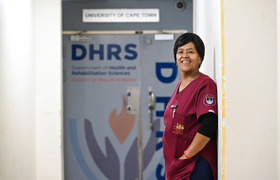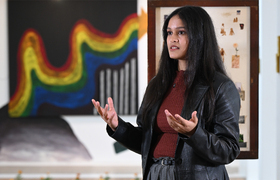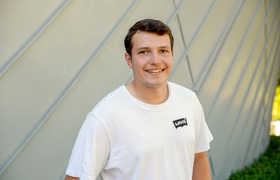‘My chronic illness has been the biggest blessing in my life’
03 September 2025 | Story Lisa Templeton. Photo Supplied. Read time 7 min.
At the age of 11 Huyaam Samuels’s health began to spiral. Plagued by an invisible disability characterised by constant pain, fatigue, spasms, joint instability and frequent dislocations, it took eight years to diagnose. During this time, there were specialists who dismissed her symptoms as attention seeking or her mother as overprotective, as she “looked normal” and “didn’t seem in much pain”.
"It was deeply frustrating. I knew what I was experiencing, yet was not being heard,” said Huyaam.
In the end, it took visionary paediatrician and University of Cape Town (UCT) alumnus and senior lecturer Dr Michelle Meiring, a trailblazer in paediatric palliative care and founder and CEO of Paedspal, to diagnose pseudo-achondroplasia. Meiring would fundamentally change Huyaam’s care – and her life – as she was by then dependent upon mobility aids and, ultimately, a motorised wheelchair as her joint stability plummeted.
“Being both her patient and [mentee], transformed my life. What stood out most was the sense of empowerment it provided. Palliative care acknowledged the reality of my condition, but reminded me that my life is not defined by it.”
Today Huyaam is a master’s in industrial organisational psychology graudand, an assistant lecturer within that department; and is contemplating her PhD topic. She also loves to relax with a greenbelt walk or run – that is when she is not with family and friends, or unwinding with a good series. She also has her sights firmly set on an academic career.
On her journey, Huyaam became a vocal advocate for the empowering, life-changing force that is effective palliative care, and served as a PatchSA Youth Ambassador and global ambassador for the Worldwide Hospice Palliative Care Alliance, addressing the World Health Organization Executive Board Session, among other highlights.
Grateful
“Growing up, I always aspired to study at the number one university in Africa, and I worked hard throughout high school to be accepted into UCT. As for industrial and organisational psychology, to be honest, I stumbled upon it after dropping a course I wasn’t enjoying during change of curriculum week!
“But once I’d completed the first semester, I immediately knew it was the right fit. It resonated with me because of its focus on people, work, and well-being. I realised it was not only academically stimulating, but a field that makes a real difference in the workplace and society.”
Huyaam has since been recognised by the Nurturing Emerging Scholar’s Programme (NESP), which identifies postgraduate students who have shown academic ability and are interested in pursuing an academic career. It’s an honour that has shaped her thinking around a potential PhD topic, and provided mentorship and support on her academic journey.
“I am especially grateful to be mentored by incredible individuals in industrial organisational psychology at UCT, who have shaped my academic and professional growth. The award has opened doors to training, research, and teaching experiences that continue to strengthen my career.”
Encouragement for other students living with a chronic condition
Huyaam said living with a chronic condition has certainly shaped her academic journey. It’s meant navigating chronic pain, fatigue, and uncertainty while balancing demanding coursework, research, and more recently, teaching responsibilities.
“At times, it challenged my confidence and required me to adapt my routines and manage my energy carefully, especially as mentally I could keep up, but physically my body often could not.”
She is especially grateful for support from the School of Management Studies and the Disability Service, which played a major role in helping her overcome challenges and continue to pursue her studies with confidence.
“Having a medical team who truly understands me has made all the difference, giving me comfort, hope, and the ability to live fully and reach my potential.”
Today Huyaam’s care is managed by an adult pain management team, under the guidance of Professor Romy Parker, the director of UCT’s Pain Management Unit. Professor Parker focused on empowerment through physiotherapy, hydrotherapy and psychoeducation, teaching Huyaam how to actively manage her condition by not just treating symptoms, but building long-term strength, confidence, and independence.
“Having a medical team who truly understands me has made all the difference, giving me comfort, hope, and the ability to live fully and reach my potential.”
Her advice to other students? “Challenges can become your greatest source of strength, teaching you discipline, empathy, and perseverance, qualities that will serve you far beyond the classroom.”
Palliative care is a basic human right
While it has not been easy, Huyaam said that living with chronic illness has given her a skillset and perspective that many peers do not have, pushing her to mature faster and manage her time and energy with discipline.
Her real turning point came when she finally found Dr Meiring, who took her teenage symptoms to heart, and fundamentally changed the trajectory of her care and pain management.
“It helped me conserve my energy for what really matters, engaging with people, following my passions, and proving that resilience and aspiration are possible, even with health challenges. Palliative care was about equipping me for the present and enabling me to shape a future that is still mine to define.”
“Advocacy is deeply personal for me. I know first-hand what it means to be heard, believed, and supported.”
It was thanks to this that Huyaam felt a deep responsibility to advocate for palliative care, particularly in South Africa where many patients and families continue to suffer without support.
“Advocacy is deeply personal for me. I know first-hand what it means to be heard, believed, and supported, and I want that for every patient and family facing similar challenges. Universal access means no family has to face these challenges unsupported, and every individual can live with greater comfort, dignity, and hope at every stage of a life-threatening or life-long illness.
“To me, palliative care should never be a privilege. It is a basic human right.”
Huyaam said through it all, her mother and sister stood by her.
“Aside from God, I owe everything to them for their perseverance, tough love, and sacrifices, adapting our home, assisting with my academic career, fighting to find answers, and encouraging me to keep going when no one else believed I would get better. Without their unwavering support, I wouldn’t be where I am today.”
Teaching at her alma mater
Huyaam currently serves as a contract lecturer in organisational psychology, where she also supervises honours research projects.
“It feels incredibly meaningful teaching students in the very classrooms where I once sat. It’s a full-circle moment: a chance to give back to the department that shaped my journey, while helping to inspire and guide the next generation of industrial organisational psychology students.”
 This work is licensed under a Creative Commons Attribution-NoDerivatives 4.0 International License.
This work is licensed under a Creative Commons Attribution-NoDerivatives 4.0 International License.
Please view the republishing articles page for more information.










